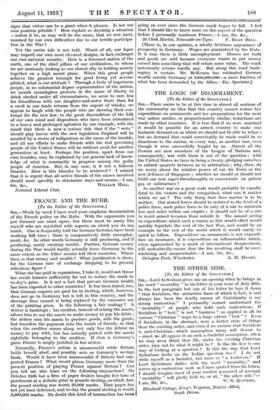FRANCE AND THE RUHR.
[To the Editor of the SPECTATOR.] SIR, Week by week I have read your emphatic denunciation of the French policy on the Ruhr. With the arguments you put forward one must agree, but there must be many like myself who are mystified with aspects on which you do not touch. One is frequently told the German factories have been working full time ; there is comparatively little unemploy- ment, &e. In other words Germany is still producing, and if producing, surely creating wealth. Further, German money during the War would hardly actually leave Germany to the same extent as the Allies' monies left their countries. Where then, is that money and wealth ? What justification is there, for the German rate of exchange dropping to its present ridiculous figure ?
What she has paid in reparations, I take it, would not throw her credit balance sufficiently far out to reduce the mark to to-day's price. Is it not a fact that private German wealth has been exported to other countries? It has been stated, too, that German exports are paid for in sterling, which, however, does not go to Germany but is left in this country, and the shortage thus caused is being replaced by the excessive use of the printing press. Is the following a fair analogy ? A debtor is bankrupt ; his creditor, instead of seizing the assets, allows him to use the assets to make money to pay his debts ; the debtor uses his assets to produce goods, sells the goods, but transfers the payment into the hands of friends, so that when the creditor comes along not only has the debtor no money to pay with, but has actually parted with the assets rightfully belonging to the creditor. If that is Germany's game France is amply justified in her action.
Naturally, France's action is unsuccessful while Britain holds herself aloof, and possibly acts as Germany's savings bank. Would it have been unsuccessful if Britain had sup- ported Prance ? What would please C-ermany more than the present position of playing France against Britain ? Can you tell me who loses on the following transaction? On October 24th last a firm of paper dealers bought five tons of parchment at a definite price in pounds sterling, on which date the pound sterling was worth 20,000 marks. That paper has not yet been delivered, and to-day the pound sterling is worth 5,000,000 marks. No doubt this kind of transaction has been going on ever since the German mark began to fall. I feel that I should like to know more on this aspect of the question before I personally condemn France.—I am, Sir, &c., 26 Cloth Market, Newcastle-on-Tyne. P. REAP BELL.
[There is, in our opinion, a wholly fictitious appearance of prosperity in Germany. Wages are guaranteed by the State. It is true there is little unemployment. Houses are built and goods are sold because everyone wants to put money earned into something that will retain some value. The mark notoriously retains hardly any. But along this road bank- ruptcy is certain. Mr. McKenna has estimated German wealth outside Germany at 1200,000,000—a mere fraction of what has been demanded by the Allies.—En. Spectator.]


































 Previous page
Previous page